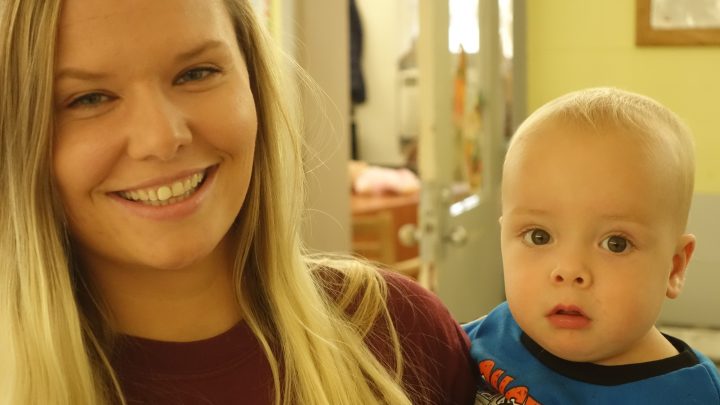
For incarcerated women with newborns, an Indiana prison unit offers a chance to bond
For incarcerated women with newborns, an Indiana prison unit offers a chance to bond

Bouncy chairs and portable cribs line one wall of a room in the baby unit at the Indiana Women’s Prison. Mothers like Jessica Adams sit at tables or walk around, holding their babies.
Adams had just arrived at prison when she found out she was pregnant with her son Dawson. He’s about a year and a half old now.
“This place has helped me,” Adams says. “They have programs here to help us with the parenting styles and what you should and shouldn’t do.”
The mothers learn skills like how to perform CPR and use car seats properly.
Some 1,000 women in America give birth each year while incarcerated. For most, that means giving the baby up to family members or foster care as soon as it’s born. But in a few places — including the Indiana Women’s Prison near Indianapolis — there’s another option: nurseries that let the mothers keep their babies with them while they finish their sentences.
The nursery is housed in a separate building at the prison, where pregnant women, mothers and their babies all live. In the main room, a foam mat scattered with soft toys covers part of the floor. Mothers and their babies share rooms along two hallways.
And in the back, fenced with barbed wire and chain link, is a grassy yard with slides and swings. Unlike elsewhere in the facility, these prisoners can go outside anytime they want with their babies.
The idea of nurseries like this one is to let mothers and babies bond during the critical first years of a child’s life, which research shows can have significant long-term benefits.
Adams and son Dawson will stay in the special unit until Adams is released.
For the women in this unit, being a mother is their prison “job,” which means they are paid prison wages to be there.
Babies get formula and food through the Women, Infants, and Children program and health care from Medicaid, just as they would on the outside. The mothers get their food and health care through the prison system, just like other inmates at Indiana Women’s Prison.

Leah Hession, who runs the program, is employed by the state’s Department of Correction. Most of the unit’s other costs are covered through charity, she said.
“Everything you see around you,” she said, “for the most part is either donated or purchased with donated money. So we’ve been very blessed with a lot of religious organizations in the area that have been supportive of the program and a lot of different community organizations as well.”
Those organizations contribute everything from formula to diapers, cribs and gift cards.
To come to the nursery, a woman’s sentence has to be up by the time the baby turns 2½. Eligibility for women with violent offenses is decided on a case by case basis. In mid-November, 16 women were living in the unit — some with their babies, others waiting to have them.
Several other states have similar programs or are developing them.
A previous version of this story misstated a limitation on a woman’s eligibility for the program.
There’s a lot happening in the world. Through it all, Marketplace is here for you.
You rely on Marketplace to break down the world’s events and tell you how it affects you in a fact-based, approachable way. We rely on your financial support to keep making that possible.
Your donation today powers the independent journalism that you rely on. For just $5/month, you can help sustain Marketplace so we can keep reporting on the things that matter to you.

















